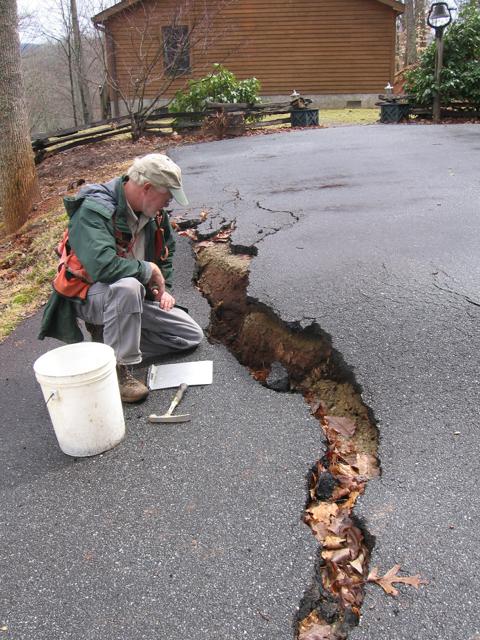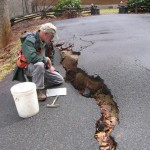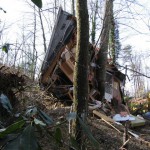- Disaster mappers: DENR geologist Rick Wooten examines a large crack that opened in a Macon County driveway when the slope on which it was built slipped last spring. The house beyond was later condemned. DENR’s Landslide Mapping Program helps property owners avoid building in landslide-prone areas, but its future is uncertain. Photo courtesy of NC Geologic Survey
- Proposed cuts to the local DENR office could mean the end of the Landslide Mapping Program, whose efforts help property owners avoid building in landslide-prone areas. This Henderson County home was destroyed last December when a road embankment failed downslope, causing a large debris flow. Photo courtesy of NC Geologic Survey
It’s a volatile point in the state’s budgeting process, and like their colleagues in other state agencies, employees of North Carolina’s Department of Environment and Natural Resources can only watch as legislators, led by a recently installed GOP majority, plan massive cuts to close an estimated $2.6 billion shortfall.
DENR, which handles everything from forest and wildlife conservation to permits regulating air and water pollution, has been a focal point for Republican leaders determined to close the budget gap solely through reduced spending, without seeking any added revenues.
One proposal calls for cutting 18 of 97 employees in the agency’s Swannanoa office, including staffers from the Air Quality Division and the Aquifer Protection Section. The plan also targets the Mooresville office, whose Inactive Hazardous Sites Branch staffers cover North Carolina’s western counties (see “Hidden Hazards,” Jan. 12 Xpress). Given the hundreds of hazardous sites awaiting cleanup (including some 50 in Buncombe County alone), such cuts could further postpone needed action, observers say.
According to some DENR staffers, GOP lawmakers are taking aim at every environmental program that isn’t federally mandated. But that approach could threaten things like the Soil & Water Conservation Districts, the Air Toxics Program and the Clean Water Management Trust Fund, which enables purchases of tracts of land to protect public water supplies. The House Appropriations Subcommittee on Natural and Economic Resources proposes slashing the trust fund’s budget by 80 percent, from $50 million to $10 million.
Diana Kees, DENR’s communications director, says her agency has just completed its first stab at tallying those positions supported by state funds without federal matching dollars. “These people are under a considerable amount of stress,” she notes. “They know their jobs are being targeted.”
In the Asheville office, the list includes staff from the Inactive Hazardous Sites Branch, the one-stop permitting program (which helps businesses and individuals navigate environmental requirements), the landslide-hazard mapping program (which helps communities reduce landslide risks), as well as some administrative positions, Kees reports.
Lawmakers supporting these severe cuts say they’re needed to eliminate redundancies, arguing that the current permit-review process takes too long. Some evidence, however, suggests a more general hostility toward any kind of environmental regulation. Rep. Roger West, a Republican from Cherokee who co-chairs the House subcommittee that prepares DENR’s budget, has previously butted heads with environmental regulators at the agency, according to The News & Observer of Raleigh (“DENR Weighs Effect of Cuts,” April 19, 2011). On more than one occasion, West has proposed legislation cutting the jobs of enforcement staff who’d issued citations against businesses favored by West for air- and water-quality violations, the paper reports.
The way Julie Mayfield of the Western North Carolina Alliance sees it, “The legislative majority has made it clear that they are interested in doing only the very minimum needed to comply with federal law.” Mayfield, the local environmental group’s director, says, “Stripping DENR of anybody who isn’t absolutely critical to federal environmental programs is one way to do that. You don’t even have to touch the authorizing legislation — you just get rid of the people.”
Environmental advocates are particularly concerned about the push to downsize DENR’s Division of Environmental Health, which investigates potential environmental violations reported by residents. Mayfield worries about a future in which, for instance, property owners call DENR about contaminated ground water and “No one answers the phone.”
Rep. Patsy Keever, a Buncombe County Democrat, shares those concerns. “Being the environmental tree-hugger that I am … it just brings you to tears almost,” she says. “What are these people thinking? It’s such a different mindset. I’m used to my beloved Asheville, where people care about the environment.”
Not all Republican lawmakers support gutting environmental oversight, however. Sen. Jim Davis, who represents Haywood and Cherokee counties, notes, “I have heard no one suggest that DENR is not providing a necessary and vital function to North Carolina. … Our job is to make sure we target the cuts to those programs that will least affect the core functions of state government.”
And Rep. Chuck McGrady, a Henderson County Republican, says that if the proposed cuts to DENR are approved, he wonders how the state will issue permits, assess and remediate sites, and perform other key functions. When it comes to environmental issues, notes McGrady, “The Senate is on even more of a tear than the House."
No one disputes the need to balance the budget, but some observers question whether state GOP leaders have thought through the potential impact of the proposed cuts. “There are a lot of economic challenges, most of them not related to regulation,” says Robin Smith, the state’s assistant secretary for the Environment. “We know that having clean air and a clean and plentiful water supply are important to economic development in this state.”
Mayfield puts it more bluntly, asserting, “It’s a false choice. We are one of the most highly regulated countries, and we still have thriving business. We did not have a mass exodus of business and industries when the Clean Air and Clean Water acts came online. Environmental regulations have only helped this country prosper.”
Of course, at this stage in the budget process, things can change quickly, as proposals move on and off the table overnight. After the various House committees finalize their proposals during the first week of May, Statehouse members will vote on the whole package; meanwhile, the Senate will be developing its own budget proposal. The two legislative bodies will then hammer out a reconciliation. The full Legislature is expected to vote on the final budget in June; the new fiscal year begins July 1.
— Send your local environmental news to Susan Andrew (251-1333, ext. 153, or sandrew@mountainx.com).






Leave it to the news to make a story out of what sells the most with locals. You show 2 situations in regards to the Landslide mapping program and we’re suppose to just stop our budget crisis?
That’s the risk you take by living in a mountainous area and should be at the owners risk…not mine way down here in the middle of the state and our problems here should not be theirs up there…unless we personally choose to do it.
Much to the typical political posturing I’d like to thank Jim Davis for his honest and straight forward statement.
Roger West is a bully. He has targeted environmental regulators in the past – not for funding issues but because he hates the permitting process. The fact is that approximately 50 companies in 1957 were able to pollute the French Broad River to the point of stinking and being a place only for refuse. Directly due to the Clean Water Act over 300 companies have permits to discharge into the river today AND it is a drinking water source to over 1 million people AND it is a source of recreation AND a source of fishing (food) and properties along the river enjoy higher values. Roger West told me directly that he wants to “light a fire under the butts of DENR” that he believes eliminating positions from 90 to 37 in Asheville office will make permitting go faster. Brilliant. He is supported by Senator David Rouzer who has been quoted in the Raleigh News and Observer as saying that “the greatest threat to economic prosperity is environmental laws”. Again, brilliant.
If North Carolina legislators Roger West and David Rouzer succeed in cutting the Department of Environment and Natural Resources positions, I want my state tax money back. I will happily give that money to the Buncombe County Government so they can develop local ordinances and protect our health and safety.